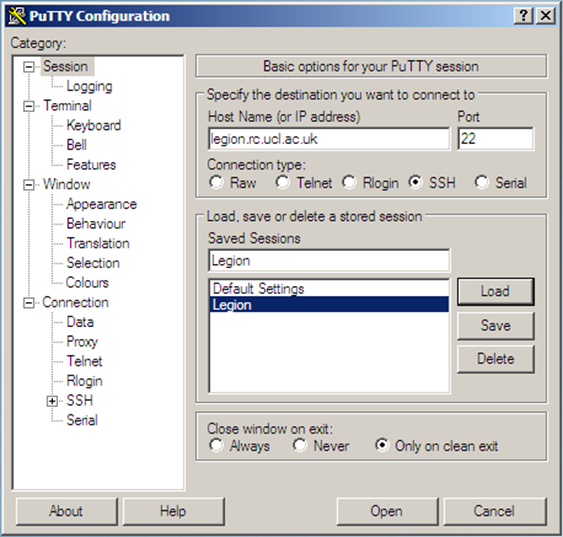Accessing Legion
Access to Legion is provided through the 4 login nodes connected to the external network:
legion.rc.ucl.ac.uk
Logging in from Linux or Mac OSX
Use the terminal and run the below command to ssh into the correct machine. Replace
ssh <your_UCL_user_id>@legion.rc.ucl.ac.uk
Logging in from Windows
On Windows you need something that will give you a suitable terminal and ssh - usually PuTTY, although you could also use Cygwin if you wanted a full Linux-like environment.
Using PuTTY
PuTTY is a common SSH client on Windows and is available on Desktop@UCL.
You can find it under Start > All Programs > Applications O-P > PuTTY
You will need to create an entry for the host you are connecting to with the settings below. If you want to save your settings, give them an easily-identifiable name in the “Saved Sessions” box and press “Save”. Then you can select it and “Load” next time you use PuTTY.

Accessing Legion from outside UCL
If you wish to access any of our machines from outside UCL, you cannot do so directly as they are behind UCL’s firewall. To do so you will have to either ssh in to UCL’s gateway first:
ssh <your_UCL_user_id>@socrates.ucl.ac.uk
and from there ssh in to the correct host as described above, or login first to your departmental gateway (if you have one) and then login from there.
UCL VPN Service
Alternatively, you can use the VPN service to connect to UCL using a virtual private network. That way, once the connection has been established, you can establish an ssh connection to the host machine directly, for example:
ssh <your_UCL_user_id>@legion.rc.ucl.ac.uk
To find out more about the VPN service please see: http://www.ucl.ac.uk/isd/services/get-connected/remote-working/vpn